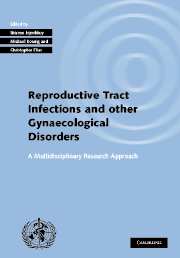 Investigating Reproductive Tract Infections and Other Gynaecological Disorders
Investigating Reproductive Tract Infections and Other Gynaecological Disorders Published online by Cambridge University Press: 07 December 2009
A common element in virtually all investigations of women's gynaecological morbidity is the high level of interaction and rapport between investigators and the communities studied, irrespective of whether the study is conducted by a research group or a NGO. In this chapter we present lessons learned from the experiences of three studies in building community rapport and maximizing participation levels. Two of these were pioneer studies of women's gynaecological morbidity, conducted in the late 1980s in rural Egypt (Younis et al., 1993) and India (Bang et al., 1989). The third is a more recent and ongoing study of HIV and sexually transmitted infections (STIs), based in rural Rakai district, Uganda (Wawer et al., 1999).
The objectives of each of the three studies were largely similar: to assess levels of reproductive morbidity and, in the case of Rakai, STIs in community settings. Project sites were two villages each in Egypt and India, containing a total population of 16500 and 4000, respectively, and an entire district in Uganda comprising a population of 384000. Populations were largely poor and female literacy rates were uniformly low. Each of these studies have included a survey focusing on self reported symptoms, risk behaviours and background characteristics, as well as clinical examination (Egypt and India) and/or laboratory testing. While the Ugandan study required a minimum of pelvic examinations, they were a central component of both the Egypt and India studies
To save this book to your Kindle, first ensure [email protected] is added to your Approved Personal Document E-mail List under your Personal Document Settings on the Manage Your Content and Devices page of your Amazon account. Then enter the ‘name’ part of your Kindle email address below. Find out more about saving to your Kindle.
Note you can select to save to either the @free.kindle.com or @kindle.com variations. ‘@free.kindle.com’ emails are free but can only be saved to your device when it is connected to wi-fi. ‘@kindle.com’ emails can be delivered even when you are not connected to wi-fi, but note that service fees apply.
Find out more about the Kindle Personal Document Service.
To save content items to your account, please confirm that you agree to abide by our usage policies. If this is the first time you use this feature, you will be asked to authorise Cambridge Core to connect with your account. Find out more about saving content to Dropbox.
To save content items to your account, please confirm that you agree to abide by our usage policies. If this is the first time you use this feature, you will be asked to authorise Cambridge Core to connect with your account. Find out more about saving content to Google Drive.